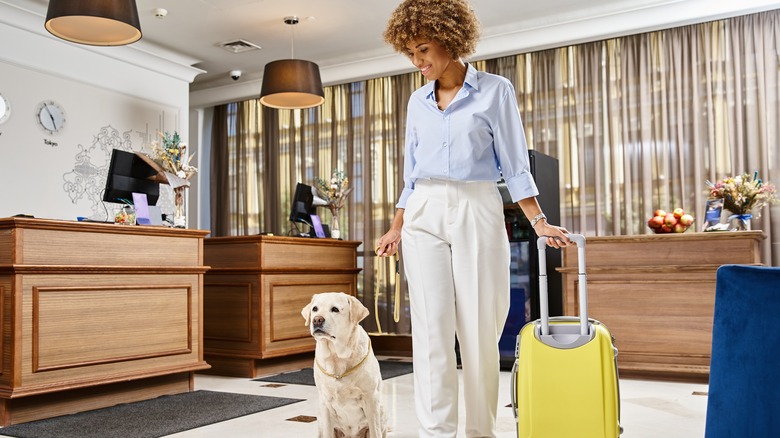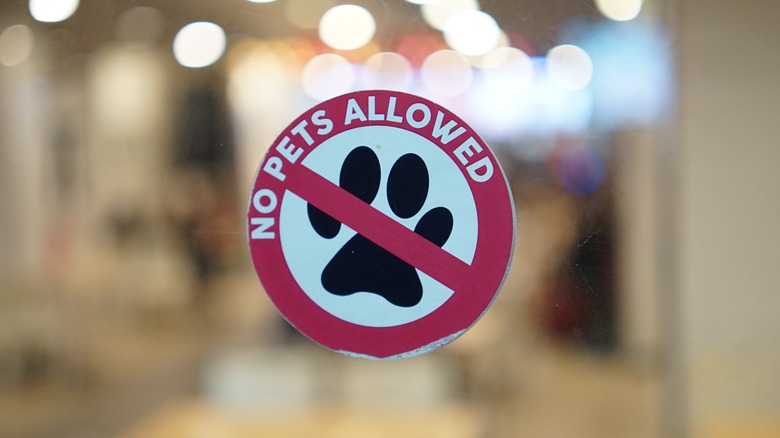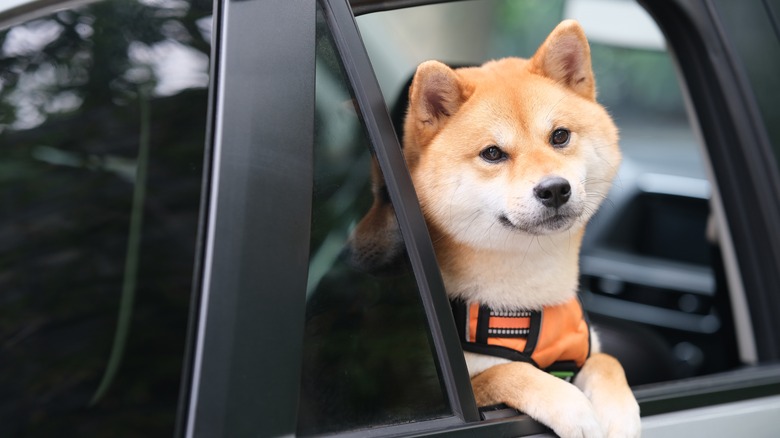Why You Should Always Complete A Pet-Friendly Hotel Checklist Before Your Stay
Ask today's pet parents, and many would probably say there's never been a better time to vacation with your pet. One 2024 poll of over 1,000 pet parents by Upgraded Points found more than half would be willing to take their furry companion on vacation. Hotel companies are well aware of this, too. More than 60% of the over 50,000 hotels surveyed by American Hotel and Lodging Association in 2021 said they would gladly accommodate pets, per Lodging Magazine.
Traveling with your pet can be a rewarding experience, but despite today's access to near-instant information and advice, it still requires thoughtful preparation to avoid potential pitfalls. The last thing you want is to have to cut your vacation short because the hotel concierge says your dog is above the weight limit or that they aren't allowed in common spaces. Completing a pet-friendly hotel checklist before your stay is essential for a smooth, stress-free trip. Whether traveling with a dog, cat, or another beloved companion, a checklist ensures you meet hotel requirements, avoid surprises, and prioritize your pet's comfort.
A well-prepared checklist is also a hallmark of responsible pet ownership. In this guide, we'll walk you through the essentials, covering everything from understanding hotel policies to creating a safe and welcoming homelike space for your pet. With proper preparation, you'll set the stage for an enjoyable journey that benefits both you and your furry friend while creating a positive environment for fellow travelers.
Verifying hotel pet policies
Because the devil is in the details — which often change — a stress-free hotel stay with your pet begins with verifying a hotel's specific pet policies. Pet policies can vary significantly between establishments, even under the same brand umbrella, so confirming the details before booking is crucial. While online resources are convenient, calling the hotel directly remains one of the most reliable ways to gather accurate information. Speaking with staff allows you to clarify additional fees, weight or breed restrictions, and room-specific policies.
For instance, Kimpton Hotels welcome pets of all sizes without extra fees, while others, like the Ritz-Carlton, may impose nightly charges or non-refundable deposits. Meanwhile, certain chains, like Motel 6, have overall weight restrictions, so keep that in mind if you're bringing more than one animal along for your stay. Additionally, some hotels, such as Loews Hotels, require up-to-date vaccination records. Others, like Rodeway Inns, may ask for veterinary certificates proving pets are flea-free. Even if documentation isn't required, carrying these records is always a smart precaution, especially in areas with stricter regulations. By confirming fees, policies, and documentation needs, you'll avoid surprises and ensure a smoother experience for both you and your pet.
Create a comfortable hotel environment for your pet
Your pet's safety and comfort in a hotel room are crucial for a positive travel experience. Start by inspecting the room for hazards like exposed wires, small objects, or cleaning supplies that could pose risks. Check that windows are securely closed or screened to prevent accidents or escapes.
To help your pet settle in, bring familiar items from home, such as toys, blankets, or their bed. These items contain familiar scents that can ease anxiety and make the space feel more welcoming. You can also try creating an anxiety scarf wrap if your pet is skittish in unfamiliar environments. Create a designated pet nook in the room for these essentials. To the extent possible, maintain their routine and make sure they get adequate exercise before travel to reduce stress. By monitoring their behavior and providing reassurance, you can create a safe and relaxing environment during your stay.
You can also ask your hotel in advance if they provide any pet amenities. For instance, Kimpton Hotels offers in-room pet beds, bowls, and access to professional pet care services like walking or sitting. Aloft Hotels' "ARF" (animals are fun) program also provides branded beds and bowls, as well as treats and toys, making stays memorable for your companion. Certain Best Western, Marriott, and Red Roof Inn locations also provide a variety of amenities tailored to pets, such as designated pet areas.
Find pet-friendly areas near your hotel
Booking a pet-friendly hotel is only half the battle; exploring the area to find safe, enjoyable spaces for your pet is equally important. Use tools like Google Maps, DogPack, or AllTrails to locate nearby green spaces such as public parks with leash-friendly or off-leash areas. If you're the more outdoorsy type, it may be worth searching ahead of time for hiking trails that allow pets. Beyond green spaces, look for cat and dog-friendly cafés or restaurants that offer outdoor seating where your furry friends are welcome. Some establishments even provide treats for furry guests, making it a special outing for both.
Safety should also be a priority. Research nearby veterinary clinics and pet hospitals to prepare for emergencies. If you're planning to travel out of state, check with your pet insurance provider to see what kinds of accidents are covered with your plan. Make sure you pack a travel kit with food, travel water bowl, medications, waste bags, and a first-aid kit tailored to your pet.
Know how to be a mindful hotel guest
Before you check into any hotel, you'll want to make sure you and your pet are capable of being mindful of the space as well as other guests. As accommodating as many hotels can be, it's still your responsibility as a pet parent to make sure you're not causing unnecessary damage or disturbing others.
For dog parents, figuring out how to manage barking during travel is important to avoiding potential complaints from staff or fellow hotel guests. You can gradually desensitize your dog to travel scenarios beforehand to reduce anxiety that may trigger their barking. Use positive reinforcement to reward quiet behavior and provide distractions like toys or treats to keep them occupied. Comfort items like a familiar blanket can also help create a sense of security. You can also talk with your vet about anti-anxiety medication or training to prepare them for being out of their normal environment. Meanwhile, if you're bringing a cat, don't forget to pack their litter box and litter to avoid any messes.
As your trip continues or draws to a close, you'll want to check off a few final steps for a smooth departure. Begin by inspecting the hotel room for messes or damage, cleaning up as needed to avoid unexpected fees. Double-check that you have all your belongings, including your pet's toys, bowls, and medications.




